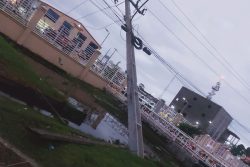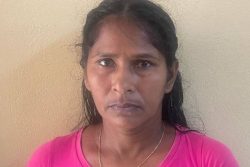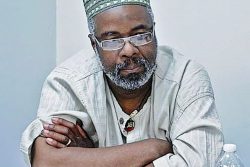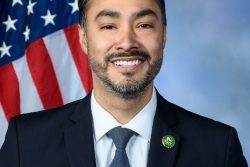On the morning of 4th June last year, I was at the Guyana Revenue Authority headquarters on Camp Street to collect my driver’s licence and had an interesting encounter with the now besieged Mr. Winston Brassington, Chief Executive Officer of National Industrial and Commercial Investments Limited (NICIL). I knew Mr. Brassington from my time in the cabinet of the former government and when he was attempting to learn to play squash at the Georgetown Club, and I found him quite good natured and pleasant. So far as his work was concerned, I can remember him making some presentations to cabinet, and although to some he came over as somewhat slick, he appeared a dedicated and competent public officer.
During our discussion, Mr. Brassington inquired what the word in political circles was about his position. I indicated that I did not have a clear idea, but reminded him that during the elections those now in power had presented him as a ‘rogue prince’ and that if I were him, that would be context in which I would base my expectations.
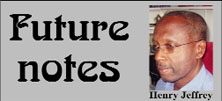 As he is now doing, Mr. Brassington indicated that he had done nothing wrong, had broken no laws, that all the books of his organisation were in order and that whatever people may think, he was simply following what he believed to be legitimate orders. He claimed to be a dedicated public servant who remains willing to work with the government of the day. I told him I was pleased to hear all of that, and I wished him luck and said (or perhaps wanted to say) that these political matters are never simply about books being in order!
As he is now doing, Mr. Brassington indicated that he had done nothing wrong, had broken no laws, that all the books of his organisation were in order and that whatever people may think, he was simply following what he believed to be legitimate orders. He claimed to be a dedicated public servant who remains willing to work with the government of the day. I told him I was pleased to hear all of that, and I wished him luck and said (or perhaps wanted to say) that these political matters are never simply about books being in order!
As we parted, the context in which I believed Mr. Brassington operated and the utopian nature of his offer to continue working for the regime came together in my mind as a picture that is much more complicated than the commonplace expectation of an impending final reckoning with an empowered and self-interested PPP/C financial oligarchy that had simply run amok.
After serious decline in the previous decade, growth returned to the economy in 1991 and between then and 1997, the economy grew at an annual average rate of about 6.5%. On these numbers, Guyana was classified a lower middle income country (GNI per capita US$736-2,935 at the time) in about 1997.
From 1997 to about 2003, there were periodic political disturbances and it was widely believed that these impacted negatively upon economic growth. In attempting to identify the most significant factors affecting economic growth in Guyana, a 2007 IMF paper ‘Why Growth Stopped’ found that ‘in addition to the steep fall in investment and labour, a deterioration of the political and institutional environment relative to that in other countries played an important role’.
The IMF estimated that average real GDP growth in Guyana would be about 6% a year between 1997 and 2000 and about 4.5% a year thereafter. But that was not to be, and between 1998 and 2005, the very period when the PPP was frenziedly trying to create its political dominance, growth was negative and so persistently so that it seemed to be chronic.
The economy became the Achilles heel of the regime, for if growth could not be realised under conditions of dominance, shared governance, which the PPP was not prepared to consider, was the next democratic alternative. Furthermore, if the PPP/C in general had political concerns, President Jagdeo, being an economist, must have had concerns about his legacy. So every- and almost anything had to be done to put the country back on the growth trajectory.
Investment had to come from anywhere and be facilitated as quickly as possible. A blind eye was turned to the use of ‘funny money’ and countries such as China, which paid little attention to the internal political and financial probity of any country, were the investors of choice. The speed with which the regime was willing to deal with all kinds of fly-by-night ‘investors’ must also be viewed in this context. The economy was also rebased and overnight grew by more than 60%.
Undoubtedly, the permissive nature of the environment that inevitably developed about this kind administrative dexterity facilitated people doing all manner of things for personal gain, but it would be false to believe that self-aggrandisement was the driving force.
The coalition’s handling of its various investigations has been somewhat questionable and heavy-handed to say the very least. But for the life of me, I could not see how Mr. Brassington or anyone could have expected his offer to continue working with the regime to be taken seriously.
He was the boss of NICIL, which was associated with some major controversial government projects, including the Amaila hydroelectric and associated road projects, the Marriott hotel project, the specialty hospital project and the Pradoville 2 housing project. In the political context, the fact that the current government has now adopted some of these very projects is of little account, since, for example, opposition to the projects had substantially been based on the lack of timely provision of quality information. Furthermore, NICIL was also thought by many to be at the forefront of all-encompassing financial wrongdoing and abuse of power, and there were promises that the new government would clean the Augean Stables.
Mr. Brassington was not employed in the traditional public service but was the head of a public corporation and was kept on by the previous regime in this sensitive position because they had confidence in him. As the head of NICIL, it was his duty to defend it as best he could and he became a vociferous defender of much of what the opposition thought was wrong. Also, given his membership of the financial oligarchy and the promises of investigations and retribution, the Trojan horse factor must also be a consideration.
That said, it is in the very nature of politics that even if Mr. Brassington is as clean as the driven snow, those who are now in government have portrayed him as a prince of rogues (leaving the kingship to former president Bharrat Jagdeo) and that is how many people, particularly coalition supporters, perceive him and NICIL. Even if the regime wanted to – and from what has appeared in the press, it seems that some members of the government might be somewhat sympathetic towards him – it could not now let him off the hook that was of its own making!
henryjeffrey@yahoo.com

